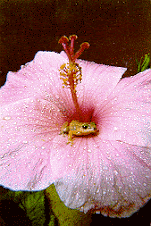Cancer cells extracted from blood
Last updated: Friday, July 04, 2008
An experimental process that snags lung cancer cells from a blood sample could give doctors real-time feedback on the most effective therapy, researchers reported.
Dr Daniel Haber of the Massachusetts General Hospital Cancer Centre and Harvard Medical School and colleagues were able to extract blood-borne cancer cells from 27 volunteers with non-small-cell lung cancer that had spread.
Advertisement
They found that changes in the number of circulating cancer cells correlated with the effectiveness of a patient's treatment and were also able to track genetic changes in the tumour cells over time.
Enables individualised treatment
The study, reported on the Web site of the New England Journal of Medicine, is another step in the quest for individualised medicine, where doctors strive to quickly assess a tumour, choose the most effective treatment, and alter that treatment as cancer cells adapt.
In December, the same group reported in Nature that their circulating tumour cells, or CTC, chip could extract malignant cells from people with breast, prostate, pancreatic and colorectal cancers, as well as lung tumours.
Now they say they have used the collected cells to identify specific mutations, which may someday help guide therapy.
"Right now you take your best guess as to what kind of treatment would work for a patient's cancer, give it to them for two or three months, and then repeat a CAT scan to see if it worked," Haber said in a telephone interview.
Continuous monitoring
"If there were a way of measuring an earlier response, that would be fantastic," he added. "The CTC chip offers the promise of non-invasive continuous monitoring."
Doctors have many choices of drugs to treat lung cancer, the world's leading cancer killer, taking the lives of 1.2 million people a year.
Yet only 15 percent of patients live five years or more.
"Treating patients with drugs specific to their particular tumour is likely to yield increased response rates, prolonged survival, and a decrease in the number of patients who are exposed to toxic drugs unnecessarily," Dr Joan Schiller of the Lung Cancer Alliance wrote in a commentary.
Schiller, of the University of Texas Southwestern Medical Centre in Dallas, said there are practical questions about whether enough cells can be extracted to make the technique effective and whether it will work for other types of tumours.
Haber said he believes it will.
The CTC chip, licensed to the privately held CellPoint Diagnostics in Mountain View, California, is 100 times more sensitive than a US Food and Drug Administration-approved technique that uses magnetic beads to try to extract cancer cells, according to Haber.
The test requires a 10 ml blood sample - just two teaspoons. It takes about eight hours to send the blood across the 80 000 tiny columns so specially designed antibody glue can latch onto passing cancer cells.
Haber said his team is trying to further automate the process to make it faster.
"If the cells are alive on the chip, which they are, and if you have a new 'smart' drug that's supposed to attack a particular protein, you can test in the cell if the protein is being attached by the drug," he said. – (Gene Emery/Reuters Health)
sábado, 5 de julio de 2008
Suscribirse a:
Enviar comentarios (Atom)


No hay comentarios:
Publicar un comentario